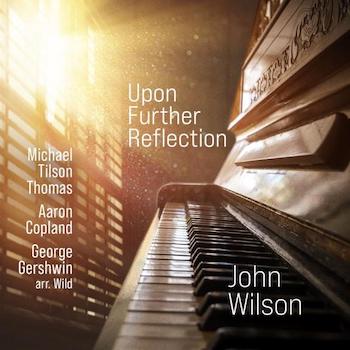Classical Album Review: Pianist John Wilson’s “Upon Further Reflection”
By Jonathan Blumhofer
Pianist John Wilson, like his mentor Michael Tilson Thomas, is a servant of the music rather than its dictator and he knows both when and how to step back and let it speak.

Given the scope and versatility of his long conducting career, it’s no surprise that Michael Tilson Thomas’s work as a composer has, until now, largely passed under the radar. In recent years, though, it’s begun to emerge. MTT’s latest champion is the pianist John Wilson, a former fellow with the conductor’s New World Symphony and a brilliantly gifted pianist.
His new album, Upon Further Reflection takes its cue from Tilson Thomas: the title track is a three-movement meditation on the artist’s early life, while subsequent selections by Earl Wild and Aaron Copland draw out different strands of MTT’s personality and long career. Taken together, the program paints an affecting portrait.
Upon Further Reflection is an ingratiating piece. Its freshness derives partly from its eclecticism – echoes of jazz, bossa nova, and Broadway collide with more abstracted, nostalgic expressivity – and partly from its wild virtuosity. Indeed, no small part of the thrill of Wilson’s performance is hearing the terrific dexterity with which the pianist dispatches its busiest textures (particularly the concluding “You Come Here Often?,” its material adapted from an aborted 1977 musical).
While Wilson’s just as comfortable with the music’s more ruminative moments – the reflective and somewhat brooding outer thirds in “Sunset Soliloquy (Whitsett Avenue 1963)” are tenderly shaped – much of this piece, like MTT, is smartly extroverted. The profile of the refrains in “Bygone Beguine (1973)” grow in intensity and definition as the movement proceeds, but they never lose their soulful vibe.
Filling out the disc are Wild’s 7 Virtuoso Etudes after Gershwin and Copland’s Piano Sonata.
The Wild set, with their knowing adaptations of familiar tunes, fit smartly alongside Reflection. And Wilson, whose playing is magnificently secure and flawlessly balanced, gives a reading of the heptalogy that rivals Wild’s own for character; it exceeds it for recorded quality.
He never gets lost in the weeds: the phrases of “Somebody Loves You” are flexibly shaped but the line always flows; the filigree in “Embraceable You” is wonderfully-directed; and “Lady Be Good” grows winningly impish at times. Meanwhile, “Liza” is limber and rich-toned, “I Got Rhythm” and “Fascinatin’ Rhythm” swagger, while “The Man I Love” sings like gorgeous, bluesy Chopin.

The brilliantly gifted pianist John Wilson.
Wilson’s account of Copland’s Piano Sonata is shaped with similar thoughtfulness. This 1942 score is years removed from the populist composer of that day – its harmonic acerbity recalls the Piano Variations of 1930 much more than Rodeo or Appalachian Spring. Regardless, it’s a powerfully-structured work whose three movements chart a course from turbulence to nervous peace.
The pianist has got real sympathy for this music: how it’s structured, how the melodic line develops, its drama is paced, the shifting tone colors, and so on. His control of dynamic contrasts and balances in the first movement are masterful, as is his transition in to the driving Allegro. In the central Vivace, the music shimmers, while the stentorian, oracular gestures at the start of the finale simply melt into the movement’s concluding diatonic counterpoint.
True, that transition provides one of the most powerful contrasts on this disc – and it’s more a compositional accomplishment than an interpretive one. But Wilson, like his mentor MTT, is a servant of the music rather than its dictator and he knows both when and how to step back and let it speak. The result is a performance of raw power and touching beauty.
Jonathan Blumhofer is a composer and violist who has been active in the greater Boston area since 2004. His music has received numerous awards and been performed by various ensembles, including the American Composers Orchestra, Kiev Philharmonic, Camerata Chicago, Xanthos Ensemble, and Juventas New Music Group. Since receiving his doctorate from Boston University in 2010, Jon has taught at Clark University, Worcester Polytechnic Institute, and online for the University of Phoenix, in addition to writing music criticism for the Worcester Telegram & Gazette.
